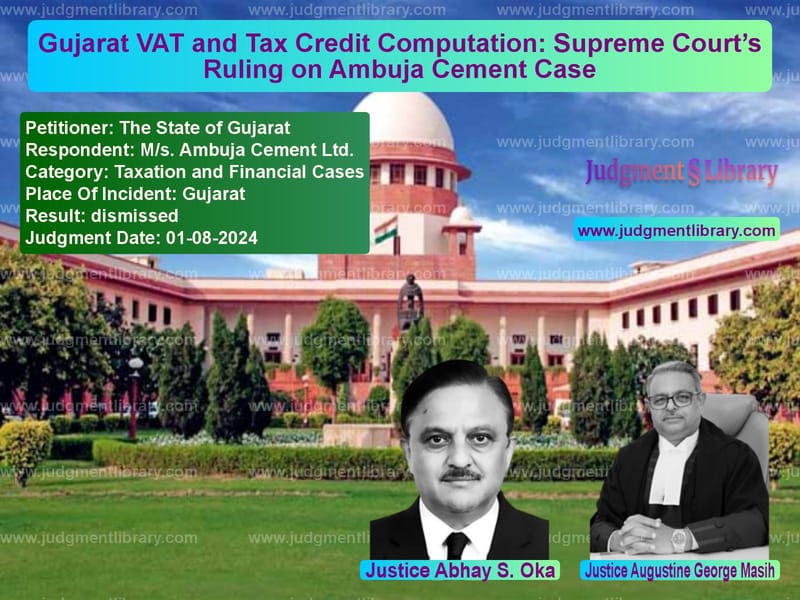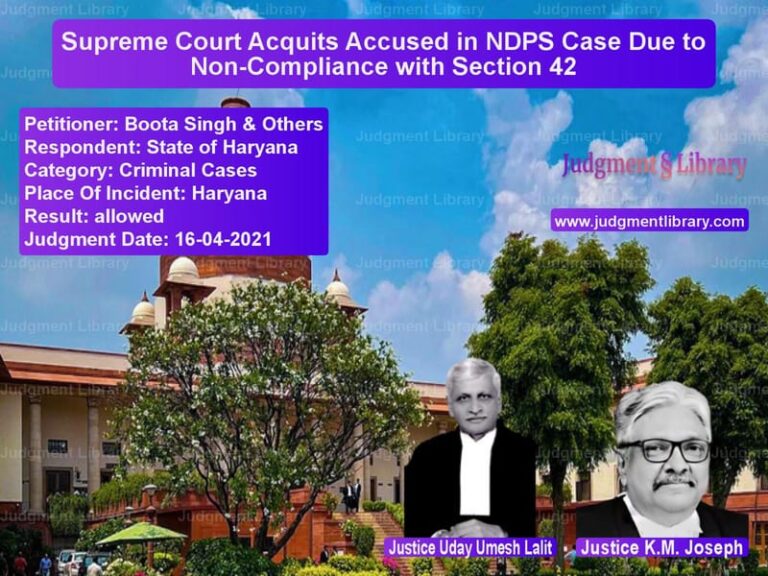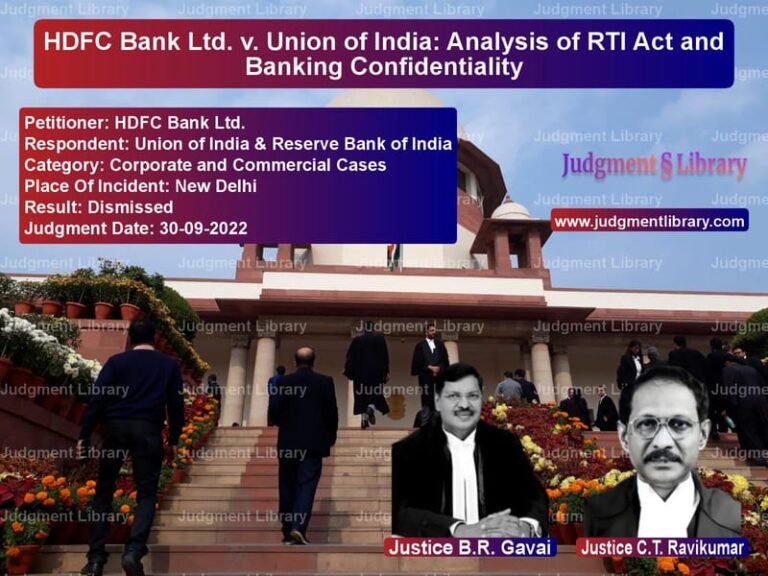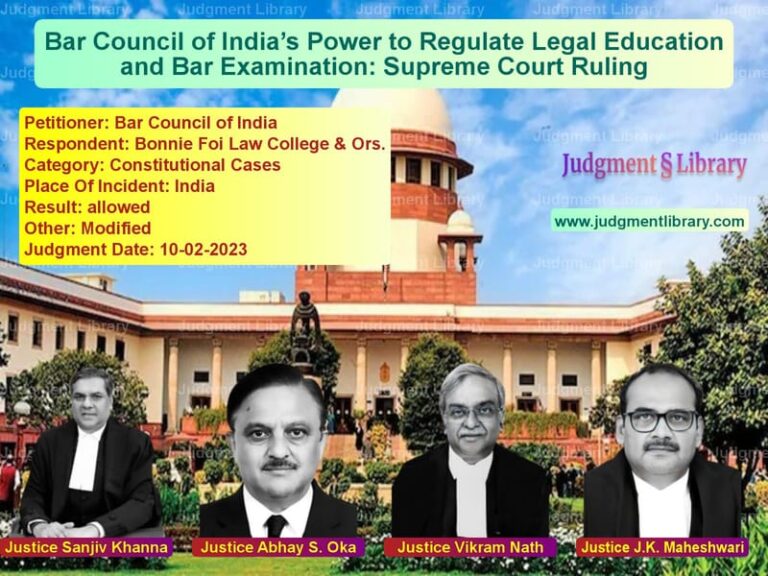Gujarat VAT and Tax Credit Computation: Supreme Court’s Ruling on Ambuja Cement Case
The Supreme Court of India has delivered a crucial judgment in the case of The State of Gujarat vs. M/s. Ambuja Cement Ltd., addressing the computation of taxable turnover under the Gujarat Value Added Tax Act, 2003 (GVAT Act). This ruling clarifies the treatment of Value Added Tax (VAT) paid on purchases and the reduction of tax credit in cases where no VAT credit was claimed.
The dispute arose when the Gujarat tax authorities included VAT paid on purchases and purchases without claimed tax credit in the taxable turnover of Ambuja Cement Ltd. The Gujarat High Court and the Gujarat Value Added Tax Tribunal ruled in favor of the company, prompting the state to appeal before the Supreme Court.
Background of the Case
The case revolves around the interpretation of Section 11(3)(b) of the GVAT Act, which pertains to tax credit reduction. The key issue was whether VAT paid on purchases and purchases on which no tax credit was claimed should be included in the taxable turnover of purchases when calculating tax liability.
Read also: https://judgmentlibrary.com/legal-battle-over-mineral-royalties-supreme-courts-landmark-judgment/
The State of Gujarat challenged the rulings of the Gujarat High Court and the VAT Tribunal, which had allowed Ambuja Cement Ltd. to exclude these components from its taxable turnover. The Supreme Court’s decision reaffirms the principles of tax calculation and the correct interpretation of statutory provisions.
Legal Issues Considered
The Supreme Court addressed two major legal questions:
- Whether VAT paid on purchases should be included in the taxable turnover of purchases for computing tax credit reduction under Section 11(3)(b) of the GVAT Act.
- Whether purchases on which no VAT credit was claimed should be included in taxable turnover for tax computation purposes.
Arguments by the Appellant (State of Gujarat)
The State of Gujarat contended that:
- The assessing officer had rightly included VAT paid on purchases and purchases without tax credit claims in the taxable turnover.
- The legislative intent behind the GVAT Act was to ensure that VAT is included within the definition of purchase price for tax calculation.
- The High Court and Tribunal had erroneously excluded VAT and unclaimed tax credit purchases from taxable turnover, leading to revenue loss.
- Section 2(32) of the GVAT Act, which defines turnover of purchases, should be interpreted to include VAT components.
Arguments by the Respondent (M/s. Ambuja Cement Ltd.)
The company argued that:
- The GVAT Act specifically defines purchase price in Section 2(18), which does not include VAT.
- Had the legislature intended to include VAT in purchase price, it would have explicitly stated so in the law.
- Tax credit reduction under Section 11(3)(b) applies only to taxable purchases, and including VAT in turnover calculations was not justified.
- Courts should not expand the scope of tax laws beyond what is explicitly stated in the statute.
Supreme Court’s Observations
The Supreme Court reviewed past judgments and statutory provisions to arrive at its decision. The key observations were:
1. VAT is Not Part of Purchase Price
The Court held that Section 2(18) of the GVAT Act clearly defines purchase price and does not include VAT. The Court emphasized that:
“Had the legislature intended to include VAT in the purchase price, it would have explicitly mentioned it in the statute.”
2. Judicial Interpretation Cannot Expand Tax Laws
The Court referred to the principle that tax laws must be interpreted strictly, and courts cannot expand their scope. It cited Commissioner of Wealth Tax, Gujarat vs. Ellis Bridge Gymkhana and P. Kasilingam vs. P.S.G. College of Technology, reaffirming that statutory definitions must be followed as written.
3. Reduction of Tax Credit Must Be Computed Correctly
The Supreme Court agreed with the Tribunal and High Court that tax credit reduction must be based on the taxable turnover of purchases and should exclude VAT components and purchases on which no tax credit was claimed.
Final Judgment
The Supreme Court dismissed the appeals by the State of Gujarat and upheld the rulings of the Gujarat High Court and VAT Tribunal. The judgment concluded:
- VAT paid on purchases should not be included in the taxable turnover of purchases.
- Purchases on which no tax credit was claimed should also be excluded from taxable turnover calculations.
- The High Court and Tribunal correctly interpreted the law, and their rulings were upheld.
Implications of the Judgment
This ruling has significant implications for businesses and tax authorities:
- Clarifies Tax Credit Calculation: The judgment sets a precedent for computing tax credit reduction under the GVAT Act, ensuring clarity in tax calculations.
- Limits Tax Authorities’ Interpretation: The ruling prevents tax authorities from expanding the scope of taxable turnover calculations beyond what the law explicitly states.
- Protects Businesses from Excess Taxation: Businesses benefit from a fair interpretation of the law, preventing undue tax burdens.
- Reinforces Legislative Intent: The decision aligns with statutory provisions and prevents arbitrary inclusion of VAT in taxable turnover.
The Supreme Court’s ruling in The State of Gujarat vs. M/s. Ambuja Cement Ltd. is a landmark judgment that reinforces the principles of strict interpretation of tax laws. It ensures that tax liabilities are computed based on statutory definitions and prevents unjustified tax demands.
Petitioner Name: The State of Gujarat.Respondent Name: M/s. Ambuja Cement Ltd..Judgment By: Justice Abhay S. Oka, Justice Augustine George Masih.Place Of Incident: Gujarat.Judgment Date: 01-08-2024.
Don’t miss out on the full details! Download the complete judgment in PDF format below and gain valuable insights instantly!
Download Judgment: the-state-of-gujarat-vs-ms.-ambuja-cement-l-supreme-court-of-india-judgment-dated-01-08-2024.pdf
Directly Download Judgment: Directly download this Judgment
See all petitions in Tax Evasion Cases
See all petitions in Banking Regulations
See all petitions in Income Tax Disputes
See all petitions in Judgment by Abhay S. Oka
See all petitions in Judgment by Augustine George Masih
See all petitions in dismissed
See all petitions in supreme court of India judgments August 2024
See all petitions in 2024 judgments
See all posts in Taxation and Financial Cases Category
See all allowed petitions in Taxation and Financial Cases Category
See all Dismissed petitions in Taxation and Financial Cases Category
See all partially allowed petitions in Taxation and Financial Cases Category







